9 spices and herbs that could (naturally) boost your mood
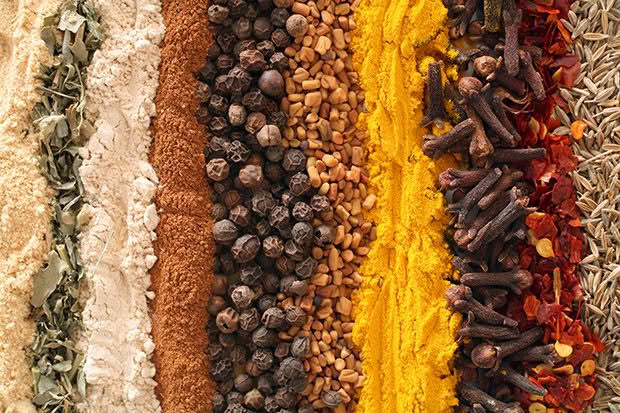
Adding herbs and spices lift a dish’s taste and can help improve your mood.
Words: Jenny Garing
Research shows many common kitchen herbs and spices can be very effective for improving mental health, and it’s easy to incorporate them into savoury and sweet dishes.
The frequent consumption of spicy foods is linked to a lower risk of death from cancer and ischemic heart and respiratory system diseases.
1. CHILLIES

How it helps: capsaicin is the compound in chillies that gives them their heat. They produce endorphins, which fight depression – the hotter, the better (capsicums are too low in capsaicin).
How to use it: great in all sorts of Mexican dishes, and hot sauces. Sprinkle chilli flakes on eggs, salads, roast vegetables, and leafy greens.
2. CINNAMON

How it helps: just smelling cinnamon enhances cognitive processing in the brain. A great source of manganese, a trace mineral that helps regulate blood sugar, and neutralises free radicals, enhancing mood. Stimulates neurons, influencing brain function by boosting concentration, memory, and attention.
How to use it: used a lot in Asian dishes, and in cakes and biscuits. Add a few sprinkles to your morning coffee or tea.
3. CLOVES
How it helps: very high in antioxidants, and has anti-inflammatory, antimicrobial, and antifungal properties.
How to use it: great for seasoning savoury dishes and adding to desserts, mulled wines, tea, and coffee.
4. GINGER

How it helps: contains vitamin B6 which improves energy levels. Also an effective pain reliever, and may help to improve memory.
How to use it: fresh in dressings and marinades, cooked with vegetables, or dry in baking and tea.
5. NUTMEG
How it helps: used since the 16th century for its anti-anxiogenic (anti-anxiety) properties. Helpful in mitigating depression and as an anti-inflammatory. Magnesium in nutmeg can help you sleep, and acts as a mild antidepressant.
How to use it: add it to cakes, puddings, and sweet sauces, to cheese dishes, over pasta, or savoury dishes.
6. ROSEMARY
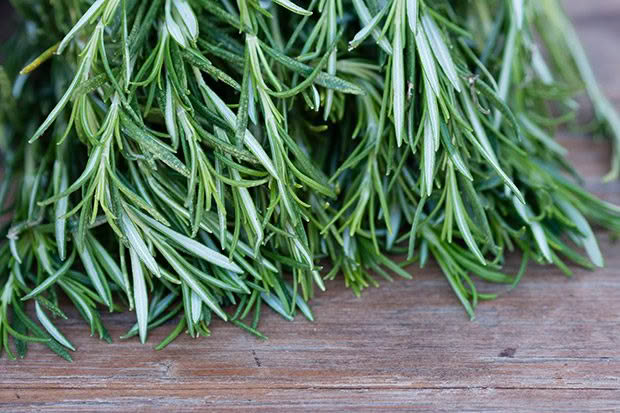
How it helps: active ingredients include rosmanol, circimaritin, and salvigenin which help in cases of physical or mental fatigue, burn-out, and depression. Also shown to help with insomnia and calming nerves.
How to use it: for flavouring meats, potatoes, and cooking oils. Great in many Mediterranean dishes. Can also be used with peas, lamb, pork, and fish.
7. SAFFRON
How it helps: known as the ‘spice of happiness’ in traditional Eastern medicine. A 2015 Iranian study suggests that saffron has similar effects on the brain to antidepressants. US studies show eating dried petals has a positive effect on the treatment of depression.
How to use it: in seafood dishes such as bouillabaisse and paella, and with rice.
8. THYME
How it helps: contains carvacrol, which is known to have antidepressant effects on the brain.
How to use it: mix with garlic as a rub on roasts. Good in tomato, capsicum and eggplant dishes. Used to season chicken and soups, and in herbal teas.
9. TURMERIC
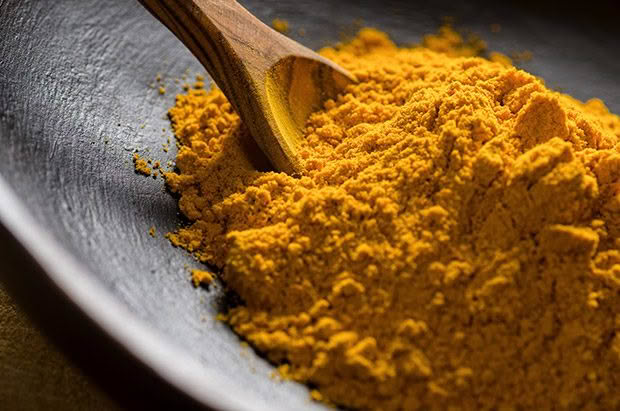
How it helps: an antioxidant and anti-inflammatory, can stimulate the release of serotonin, shown to help with depression. Doses in some studies are too high to use in cooking (500mg twice a day), but even moderate use improved mood and mental clarity after 4-8 weeks.
How to use it: the medically active ingredient in turmeric is curcumin which is best absorbed by the body when used in combination with fresh ground black pepper and an oil or fat for maximum benefit. Usually used in Indian and Thai curries, but can be added to fruit-based desserts and smoothies, scrambled eggs, roasted vegetables, and soups.
Recipe: Persian Jewelled Pilaf
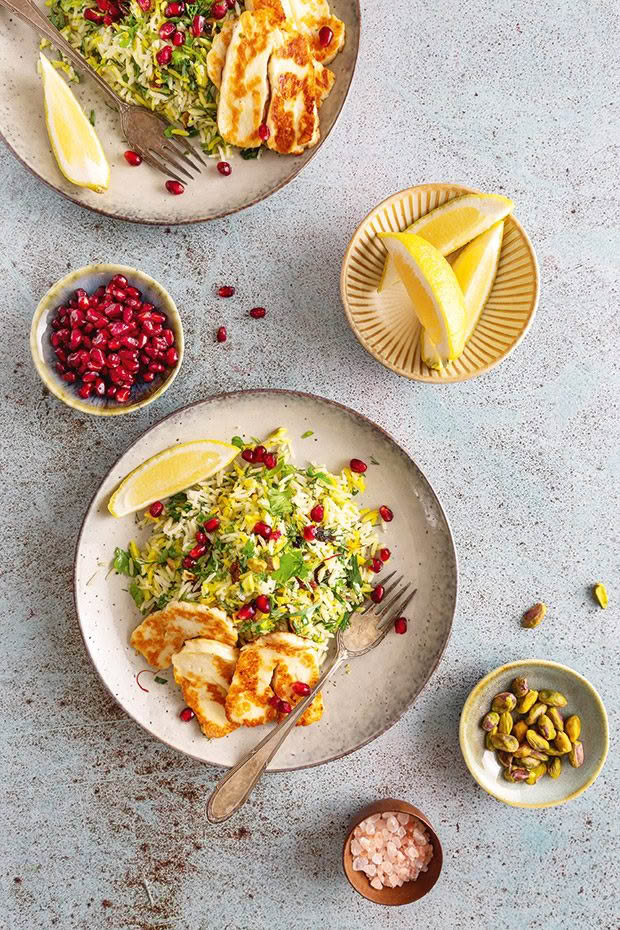
I use Sunrise Naturally Brown Rice & Quinoa in this dish, but you can use any mix of wholegrains you prefer.
Serves: 4
Time: 25 minutes
INGREDIENTS
1 cup mixed wholegrains
2 cups water
¼ cup, freshly squeezed orange juice
3 tbsp saffron water
1 tbsp olive oil
½ cup, thinly sliced red onions
a pinch of turmeric powder
¼ cup slivered almonds, toasted
¼ cup pistachios, toasted and chopped
salt
fresh mint leaves and pomegranate arils
METHOD
In a dry frypan heat about 20 saffron threads until they are dry and fragrant (don’t burn them). Grind them with the back of a spoon, then add 1 cup of boiling water. Let it sit for at least an hour (up to 12) to infuse.
Put the wholegrains in a deep saucepan and add the water, orange juice and saffron water. Bring to a boil, then reduce heat and cook covered for 20-22 minutes or until all the liquid is absorbed.
Remove from the heat, but keep covered for 5 minutes, then open the lid and fluff gently with a fork. Set aside.
While the grains are cooking, heat the oil in a large skillet. Add the onions and sauté until lightly caramelised.
Add the turmeric and nuts and toss for a few seconds until just warm.
Tip in the cooked grains and toss gently to combine. Season with salt to taste, garnish with fresh mint leaves and pomegranate arils. Serve warm.
Recipe: Happy Liver Salad
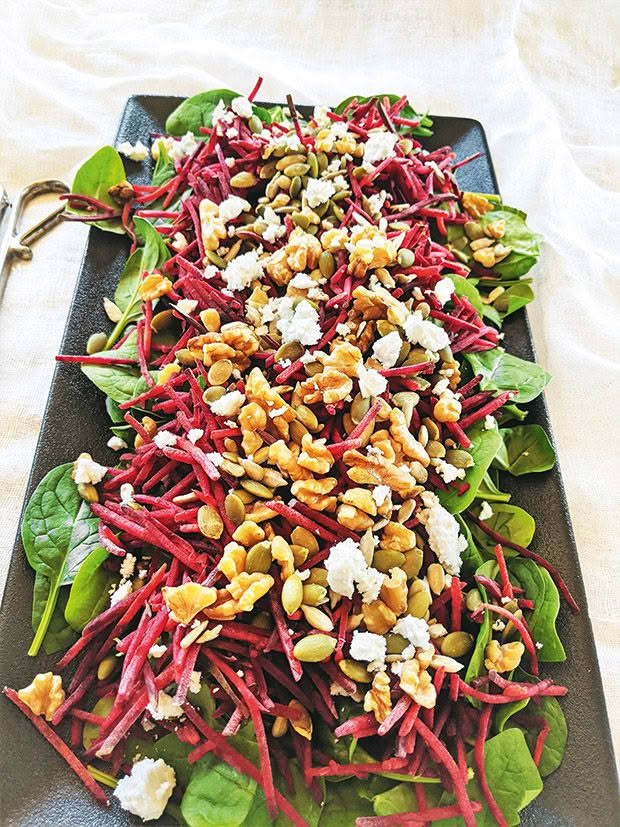
Serves: 4
Time: 15 minutes
INGREDIENTS
300g washed baby spinach
2 raw beetroot, peeled and grated
150g of salty, crumbled feta
¼ cup sunflower seeds
¼ cup pumpkin seeds
¼ cup walnut pieces
¼ cup turmeric citrus dressing, recipe below
METHOD
Toast all the seeds in a dry frying pan, moving constantly, or on a tray in the oven. Set aside to cool.
On a large platter, make a bed of spinach, cover with beetroot, crumble the feta over it, top with the toasted seeds and drizzle with dressing.
Recipe: Turmeric Citrus Dressing
INGREDIENTS
1 tbsp lemon juice
1 tbsp orange juice
1 tbsp red wine vinegar
1 tsp honey
1 ½ tsp Dijon mustard
pinch turmeric
5 tbsp olive oil
METHOD
Place all the ingredients in a jar with a tight-fitting lid, and shake well. Chill until serving. Just before serving, shake the dressing again, then drizzle over the salad.
Recipe: Rosemary, Thyme & Garlic Chicken
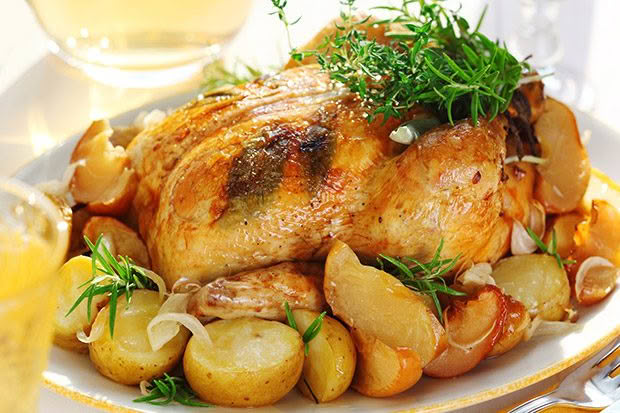
Serves: 4
Time: 30 minutes (not including marinading time)
You can use any cut of chicken: skin on or off, bone-in or not, skin or skinless, trimmed of excess fat or not. To get the best flavour, marinate overnight.
INGREDIENTS
4-5 chicken thighs (200-250g)
2 tbsp lemon zest
⅓ cup lemon juice, fresh squeezed
4 cloves garlic, minced
2 tbsp fresh chopped thyme (or 2 tsp dried)
1 tbsp fresh chopped rosemary
1 tsp salt
1 tsp black pepper
2-3 tbsp butter or oil
METHOD
Use the tip of a sharp knife to slice each thigh into 2-3 pieces, about 1cm thick. This helps the marinade to penetrate into the flesh.
Add the lemon juice, lemon zest, garlic, thyme, rosemary, salt, and pepper to a small bowl, and whisk to make the marinade.
Place the chicken pieces into the marinade and mix until the chicken is well coated. Leave in the fridge for at least an hour, but ideally overnight.
Add the butter or oil to a large frypan. Remove the chicken from the marinade and place in a single layer in the pan. Cook for 10-15 minutes, or until the chicken is cooked through. Baste the chicken with the marinade while cooking to keep it moist.
Recipe: Overnight Pumpkin Oats
This recipe is full of nutrients that contribute to good mental health, including tryptophan and omega-3 fatty acids. It’s also an easy, healthy, and tasty way to start your day.
Makes: 1 serving
Time: 10 minutes (plus overnight in the fridge)
INGREDIENTS
¼ cup regular rolled oats
¼ cup milk, almond milk, or coconut milk
¼ cup Greek yogurt (plain or vanilla)
¼ cup pureed cooked pumpkin
1 tbsp chia seeds
1-2 tsp maple syrup to taste
¼ tsp pumpkin pie spice (To make a batch, mix 2 tsp cinnamon, 1 tsp ground ginger, ½ tsp cloves until blended. Store extra in airtight container)
METHOD
Mix all ingredients in a jar and shake until well blended. Leave in the refrigerator overnight. Garnish with nuts of your choice before serving.
SPICE UP YOUR LIFE
This blend from my Brazilian friend Heloise can be sprinkled on cereal, porridge, over grapefruit, or add half a teaspoon to a plunger of coffee. Mix 14g of cinnamon, plus 7g each of nutmeg, coriander, cloves and ginger. Store in an air-tight jar.
Love this story? Subscribe now!
 This article first appeared in NZ Lifestyle Block Magazine.
This article first appeared in NZ Lifestyle Block Magazine.
